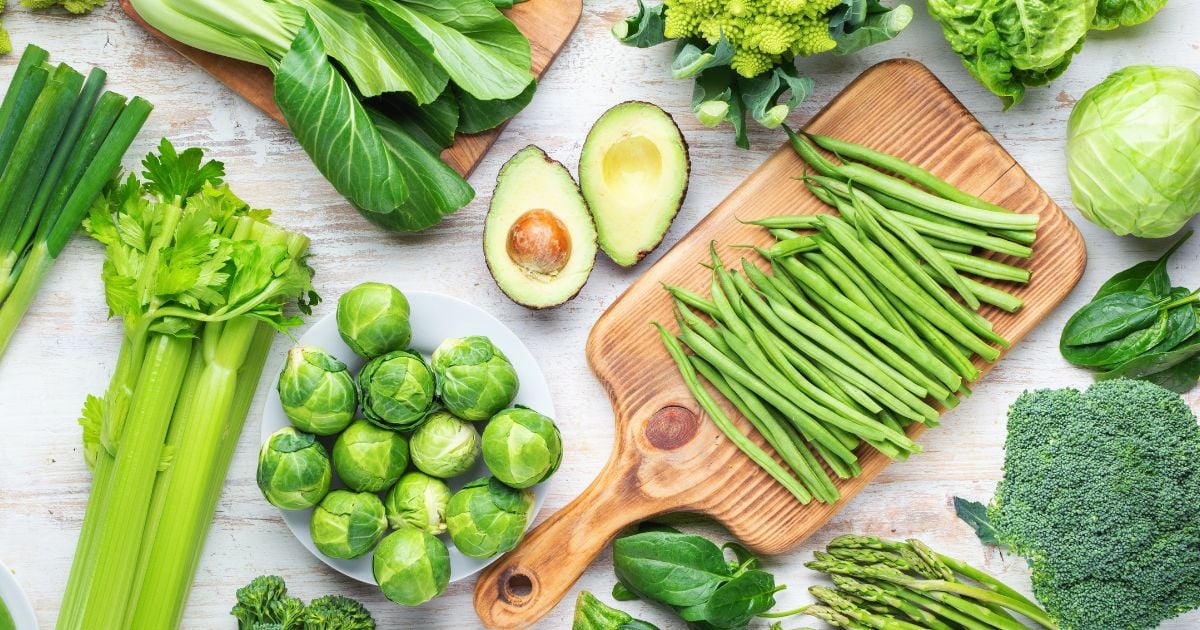One of the most common questions people ask after receiving a prediabetes diagnosis is what is the best prediabetes diet to follow.
With lifestyle changes, including a healthy diet and increased physical activity, it is often possible to prevent or delay the onset of type 2 diabetes.
This article will explore everything you need to know about what foods you should eat and what foods you should stay away from if you’ve been diagnosed with prediabetes.

What is prediabetes?
Nearly 1 in 3 American adults have prediabetes—and many people do not even realize that they have the condition.
Prediabetes is defined as elevated blood sugar levels (both fasting and after meals), but they are not elevated enough to constitute a type 2 diabetes diagnosis.
Blood sugar levels for prediabetes are the following:
- Fasting blood sugar between 100-125 mg/dL
- Blood sugar 2 hours after a meal between 140-199 mg/dL
- An HbA1c test between 5.7–6.4%
Receiving a prediabetes diagnosis can be scary and overwhelming. However, with the right management tools, you can stay healthy and even reverse your diagnosis!
How is prediabetes managed?
Prediabetes is managed primarily through dietary and exercise changes. Many doctors encourage their patients to lose weight to help lower insulin resistance and blood sugar levels.
In fact, committing to 150 minutes of exercise per week can delay or cut your risk of developing type 2 diabetes by 58%.
For some individuals, medications such as metformin may be prescribed, but diet and exercise can be just as effective.
Take small steps to increase your daily exercise—literally. Increasing the number of steps you take per day is a great way to give your exercise routine a boost.
“I think the biggest changes in my diet have been reducing the amount of fast food and sugary drinks I have regularly. I’ve also reduced my dinner portions but have mostly reduced the amount of rice, noodles, and pasta I have several hours before bedtime. I also work out at least five times a week.”
Venus Jones (read Venus’ story of reversing prediabetes)
What types of foods should I eat?
Diet will vary by patient and everyone is different, but there are some general guidelines that most people should follow if they’ve been recently diagnosed with prediabetes.
Always check with your doctor before making any changes to your diet.
Center your diet around the following food groups:
Low-glycemic vegetables
Low-carb and cruciferous vegetables like broccoli, cabbage, cauliflower, spinach, kale, brussels sprouts, bell peppers, tomatoes, cucumbers, onions, green beans, and green lettuces generally do not cause blood sugar spikes and can help improve insulin sensitivity.
They contain plenty of healthy vitamins, minerals, fiber, and antioxidants and should be enjoyed in abundance.
Higher glycemic vegetables, such as sweet potatoes and white potatoes, plantains, carrots, corn, sweet peas, sweet corn, and parsnips are also excellent sources of vitamins, minerals, and fiber.
However, they do contain more grams of carbohydrates, which may spike blood sugar levels. This may be dangerous for people with prediabetes.
Whole fruits
Whole, low-glycemic fruits such as blueberries, raspberries, strawberries, blackberries, coconut, avocados, cherries, apples, oranges, lemons, and limes are excellent sources of vitamins, minerals, and fiber.
While they do spike blood sugars slightly, they are an excellent choice if you’re craving something sweet.
Always eat whole fruits, and avoid fruit juices, which cause rapid blood sugar spikes.
Lean protein
Lean proteins like chicken, turkey, fish, beans, legumes, tempeh, and tofu are all excellent sources of nutrients and typically do not spike blood sugar levels.
Including lean protein in your diet is a great foundation for a healthy meal. Just make sure that any animal proteins are grilled, steamed, or broiled.
Healthy fats
Healthy fats are an important part of any diet, but especially if you have prediabetes.
Monounsaturated and polyunsaturated fats have been shown to have a beneficial effect on cholesterol levels, which can lower the risk of heart disease.
Healthy fats are also essential for the absorption and transport of certain vitamins, such as vitamins A, D, E, and K. These are fat-soluble and need some level of dietary fat to be properly absorbed into the body’s tissues.
Eggs, fish, and nuts are great sources of both protein and healthy fats. Avocados, olives, extra virgin olive oil, and peanut butter are all great sources of healthy plant-based fats.
Low-fat dairy
Greek yogurt, low-fat cheese, cottage cheese, and low-fat or plant-based milk are excellent sources of protein and calcium, which are crucial to a healthy diet.
Dairy products do not abruptly spike blood sugar levels, even though they contain lactose—a naturally occurring sugar present in dairy milk.
Drink milk without any added flavorings or sugar, and stick with lower-fat dairy options, which contain less fat, saturated fats, and calories.
Whole grains
Moderation is key.
While whole grains do contain blood sugar-spiking carbohydrates, options such as brown rice, bulgar, farro, barley, quinoa, black rice, and millet contain more fiber.
The fiber causes the carbohydrates to be absorbed slowly, preventing sharp spikes in blood sugar.
These complex carbohydrates also keep you fuller for longer and give you longer-lasting energy.
Beverages
Always make sure to stay hydrated with water! You can also enjoy tea and coffee if you’re not sensitive to caffeine.
Make your beverage even more health-friendly by skipping the cream and sugar.
What types of foods should I avoid?
Now that you’ve got a grocery list for success, it is helpful to know what foods don’t align with your health goals.
Watch out for the following food groups:
Refined carbohydrates
Refined carbohydrates are full of fast-acting carbohydrates and do not contain healthy fiber. These include white bread, white rice, white flour, cakes, cupcakes, and pastries.
Studies show that eating refined carbohydrates increases one’s risk for type 2 diabetes, hypertension, and heart disease.
Processed foods
Processed foods, such as chips, pretzels, donuts, tarts, pies, and ice cream are high glycemic. This means that they spike blood sugars quickly.
Regularly eating these types of foods will increase your risk for obesity, type 2 diabetes, high blood pressure, and heart disease. It is best to avoid these types of foods altogether.
Sugary beverages
Sugary beverages such as sodas, fruit juices, sweet teas, and energy drinks usually won’t support your health goals, especially if you have prediabetes.
They contain added sugars while offering no fiber or necessary vitamins.
In fact, drinking sugar-sweetened beverages is linked to developing insulin resistance and type 2 diabetes.
Aim to have fewer than 25 grams of sugar per day ( for women) and 36 grams of sugar per day (for men.)
To put these numbers in perspective, a single 12-ounce can of soda contains almost 37 grams of sugar, exceeding the daily limit for both men and women.
Fried, greasy foods
Fried, greasy, fatty foods are full of unhealthy saturated fats and excess carbohydrates and calories.
Eating these types of foods increases your risk for weight gain, heart disease, and hypertension. These foods also increase insulin resistance, making the development of type 2 diabetes more likely.
Avoid these types of foods if you have prediabetes because heart disease is the number 1 cause of death in people with diabetes.
Sugary condiments
Sugar can be a sneaky ingredient! You’ll find it in your favorite condiments, sauces, syrups, and dressings.
Sometimes these sugary condiments seem healthy, but the hidden sugar will increase your blood sugar levels.
Stick with all-natural, sugar-free dressings, such as homemade olive oil and lemon juice dressing with a pinch of pepper.
Order entrees with all sauces and dressings on the side to use more sparingly. Moderation is key.
Frequently asked questions
What types of foods lower blood sugar?
There is no food that will lower blood sugar per se, as only medications and exercise can properly lower high blood sugar.
If you are prescribed insulin or another diabetes medication, never try to substitute foods for taking your medications.
If your blood sugars are consistently high and you’re managing your diabetes with diet and exercise alone, talk with your doctor about alternative therapies to help bring down your levels.
However, there are plenty of foods that have a lower effect on blood sugar levels. These include lean proteins, green, leafy vegetables, and healthy fats.
Talk with your doctor before making any dietary changes.
Does prediabetes always turn into type 2 diabetes?
Good news! Getting a prediabetes diagnosis does not mean you will develop diabetes.
Many people delay, and even prevent, the onset of type 2 diabetes by losing as little as 5–7% of their total body weight.
Talk to your doctor about building an exercise and diet plan that will help you prevent type 2 diabetes. The National Diabetes Prevention Program is another great educational resource.




Plateau
Caribbean Foods like yuca, malanga, ñame, calabaza Taína, chayote, and more …
Please help me. All this add on sweetness’s in the food is not good for anyone.
Susan
I was diagnosed as prediabetic. Changed my diet and last 2 checkups I was fine, but I still stick with the diet.
Nancy Cansler
I’m prediabetic & only weigh 120lbs. Can’t afford to lose too weight.
Shyam
Thanks for sharing this list with us.